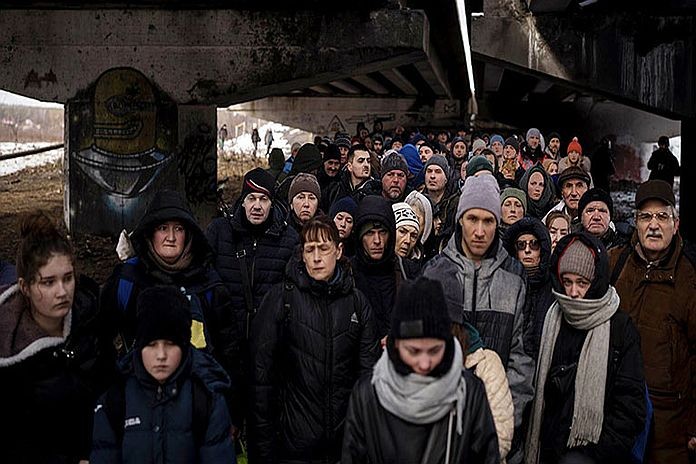BUDAPEST, Hungary, (ILO News) – As the war in Ukraine enters its second year the ILO is proposing a six-point plan to support the country, addressing humanitarian, early recovery and developmental issues.
The response was developed following consultations with the ILO’s tripartite constituents in Ukraine – government, workers’ and employers’ organizations. It includes continuing with humanitarian aid where the ILO can add value, helping refugees and internally displaced persons (IDPs) access labour markets and education, and facilitating a range of income support measures. Other proposals include economic stabilization measures in safer parts of the country, support for priority development reforms, and financial assistance for trade unions and employers’ organizations.
Details of the plan are contained in a new ILO brief on the Organization’s Ukraine crisis response, Impact of the crisis on employment, incomes and social protection . The brief also summarizes the broad range of labour market-related assistance the ILO has already provided to Ukraine, as well as to Moldova – the most vulnerable host country for Ukrainian refugees. This includes providing 3.6 million displaced people with information to counter human trafficking and forced labour; training 400 Ukrainian labour inspectors and social partner representatives in psychosocial first aid; training all Moldova’s labour inspectors in human trafficking and forced labour issues; and giving 76,000 enterprises information on conducting business under martial law.
The ILO also helped Ukraine’s ministry of education and science to launch a new online platform to help 225,000 technical and vocational (TVET) students continue their studies.
The Federation of Employers of Ukraine (FEU) has also received ILO backing with manufacturing and distributing humanitarian aid. More than 4,135 family-sized food and hygiene boxes were produced by Ukrainian companies. The aid is estimated to have reached around 15,000 IDPs and the local production of the goods has helped to preserve jobs and businesses in Ukraine while also creating tax income for the government. This initiative built on a similar ILO/FEU project that, with Danish funding, has already reached more than 3,550 people in Kharkiv and Mykolaiv – two of the regions that are much affected by the war.
The ILO is also supporting a new FEU service to facilitate business matchmaking and promote Ukrainian products to the EU market.
Ukraine has been hit by large-scale employment and income losses because of the Russian invasion and millions more Ukrainians could be pushed into poverty as the fighting continues, according to the ILO brief.
The ILO estimated that employment in October 2022 was 15.5 percent (2.4 million jobs) below the 2021, pre-war, level. This projection was below the ILO’s April 2022 estimate, made soon after the war began, which suggested that 4.8 million jobs would be lost. The change is because larger areas of the country have returned to Ukrainian control since spring 2022, facilitating an increase of economic activity.
It is feared that the widespread missile and drone strikes launched by the Russian armed forces against Ukraine’s civilian infrastructure since October 2022 could derail the partial labour market recovery seen in the middle of 2022, which the brief describes as “modest and highly fragile”. Recent data from the Ukrainian Central Bank shows a decrease in the demand for labour, as measured by the number of vacancies posted on key online job portals. ILO employment projections, based on current macroeconomic forecasts, suggest stagnation in 2023, as the hostilities continue to constrain the Ukrainian economy and its labour market. The broader economy suffered a severe decline, with an estimated year-on-year drop in GDP of 35 percent in the last quarter of 2022.
The fighting has also had a significant effect on the country’s social protection system, which faces increased outgoings and reduced revenues. Large numbers of IDPs and refugees are also posing extreme social and economic challenges, the ILO brief says.
“Support to Ukraine needs to include humanitarian, budgetary, and development assistance in parallel, but should not be a staged approach with development assistance starting at a later phase,” said Markus Pilgrim, ILO director for central and eastern Europe. “Job preservation and economic stabilization is needed now to secure livelihoods. Moreover, the government, workers’ and employers’ organizations have an ambitious modernization agenda for the country, ranging from the digitalization of public employment services to a new labour code. They want to begin laying the foundations for an early recovery and reconstruction now.”





